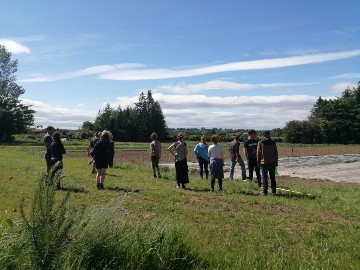A Day in the Life (Summer 2021)
Continuing our series of blogs by our current interns we hear from Sally who tells us about her impressions of visiting two successful organic horticultural enterprises Castleruddery Organic Farm (Hilda & Dominic Quinn) and Moyleabbey Organic Farm (Liam Ryan)
by Sally McCarrick
Many gardeners will agree, when working it can be hard to remember to lift one’s head and smell the roses or in a market garden setting appreciate the Fibonacci’s sequence in a head of Romanesco broccoli. The same can be said when the focus is on the day to day tasks that ensure a successful harvest each week. Tunnel vision can be quick to set in and if not kept in check with regular stimulation, its effects can also be long term/long reaching. It can be easy to miss the potential gains created by a slight alteration of current methods or introduction of new practices/crops, such as increased yield, net profit, environmental benefits.
The Farm walks have been an excellent visual resource of how existing organic markets operate. These walks continue to highlight the versatility of growing organically and how easily adaptable various growing practices are; enabling each grower to create a unique organic system to suit their needs and site conditions, while not exceeding the organic standards and principles set by Organic certification bodies or the earth’s natural resources.
The owners have been generous with sharing their knowledge and experience. They have learned the craft the hard way, being the fledging organic growers in Ireland, who returned to the methods of our forefather’s past – small in scale but big in diversity and paving the way for us. Fortunately for us OGI Interns, we can access this broad area of tried and tested knowledge, ranging from Liam’s highly praised and delicious strawberry varieties, colorful oriental salad mixes to methods of bed preparation, best machinery practice, right down to the type of quick release pegs used in the tomato tunnels that save time and tantrums. Thankfully, they are not shy about sharing lessons they learned the hard way through trial and error, or their experiences of hardship with certain crops and growing methods. As there is much for us newbies to gain from hearing their experiences firsthand than there is reading it from a book. Dominic’s recollection of harvesting Jerusalem artichoke in the depth of winter and snow with the aid of a potato harvester, will stay with me. Luckily this has only slightly reduced the glow that this highly versatile crop holds in my eyes.
After a thorough walk of the farms, detailed description of jobs carried out through the year and the graft involved, the admiration these farmers have for the land [also true for the previous growers we visited] is very clear and indeed is confirmation that small scale organic is not only environmentally best practice but also well worth the effort. These farm visits serve as excellent reminders to always look up, observe your surroundings and current systems, engage with other growers and, most importantly, continue to evaluate and adapt.

